59% Pekerja Resign - Anda Next?
Diterbitkan pada 11 Okt 2025
11 min baca
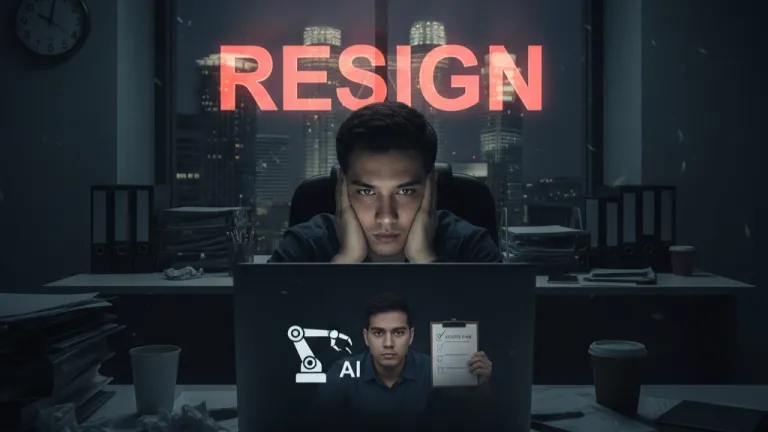
Perkara Yang Universiti Tak Pernah Ajar
59% berhenti kerja sebab toksik.
67% burnout sekarang.
44% akan resign tanpa latihan AI.
Ini realiti dari kajian ribuan pekerja Malaysia.
Yang tak ada orang berani cakap terus terang.
Yang Tak Diajar University bawa data, insights boleh guna.
Bukan teori kosong.
Jom kita mulakan.
10 Realiti Yang Akan Ubah Kerjaya - Atau Musnahkannya
59% syarikat sedang ambil pekerja.
Tapi kebanyakan nak “unicorn” dengan gaji junior.
45% pekerja dah kena impact AI SEKARANG.
Keselamatan kerja anda hanyalah ilusi.
59% berhenti sebab budaya toksik.
Tapi 48% juga tolak tawaran bagus (kenapa?)
91% nak connection di pejabat.
Namun 43% overall (47% Gen Z/Millennials) resign kalau dipaksa balik.
Paradoks kan?
46.5% utamakan balance berbanding gaji.
Wang tak boleh beli ketenangan jiwa.
67% burnout.
Millennials paling teruk 69%.
Tekanan generasi sandwich.
65% Gen Z akan cabut tanpa rasa kepunyaan.
Tribe lebih penting dari gaji.
56% Gen Z kurang motivasi sebab gaji.
Tapi perlukan ia untuk hidup.
Catch-22.
Harmony, Hierarchy, Face.
Abaikan ini, kerjaya mati perlahan.
KL vs Penang vs JB.
Pilih salah bandar, bazir 5 tahun umur anda.
Sepuluh kebenaran ini contradict nasihat kerjaya konvensional.
Itulah tujuannya.
Universiti ajar teori.
Yang Tak Diajar ajar survival.
Kalau anda baca ini, anda dah selangkah lebih depan.
Dari mereka yang masih percaya playbook lama berkesan.
Realiti #1: Pasaran Kerja Sedang Buka Pintu - Tapi Persaingan Makin Kejam
59% syarikat sedang ambil pekerja sekarang.
Tapi persaingan paling kejam yang pernah ada.
Teknologi 41% permintaan.
Jualan 36%.
AI/analisis data paling hot.
Bukan sekadar “ada peluang”.
Ada peluang UNTUK YANG BERSEDIA sahaja.
Yang lain ketinggalan.
Pasaran kerja macam musim durian.
Nampak melimpah, tapi buah manis hanya untuk mereka yang tahu cara pilih.
Kemahiran adalah kepakaran pilih-durian anda.
Ahmad, 29 tahun, ditolak 15 kali temuduga.
Kemahiran lapuk 2 tahun.
3 bulan belajar AI - dapat kerja dalam beberapa minggu.
Kemahiran luput lebih cepat dari makanan dalam panas KL.
Pembelajaran berterusan bukan pilihan - ia oksigen kerjaya.
Syarikat dakwa ‘kekurangan bakat’.
Tapi tawar gaji junior untuk kemahiran senior.
Bukan kekurangan - masalah harga.
Tingkatkan kemahiran bukan optional.
Ia survival.
Pasaran bergerak, anda duduk diam, anda jadi tidak relevan.
Panduan Pasaran Kerja Randstad pecahan mengikut industri.
Semak jangkaan gaji sekarang.
Realiti #2: AI Dah Duduk Sebelah Meja - 45% Pekerja Dah Rasa Kesan
45% pekerja laporkan AI memberi kesan kepada kerja harian SEKARANG.
44% akan berhenti tanpa akses latihan AI.
Unjuran mengejutkan.
Automasi mungkin gantikan 25% waktu kerja (450,000 pekerjaan) menjelang 2030.
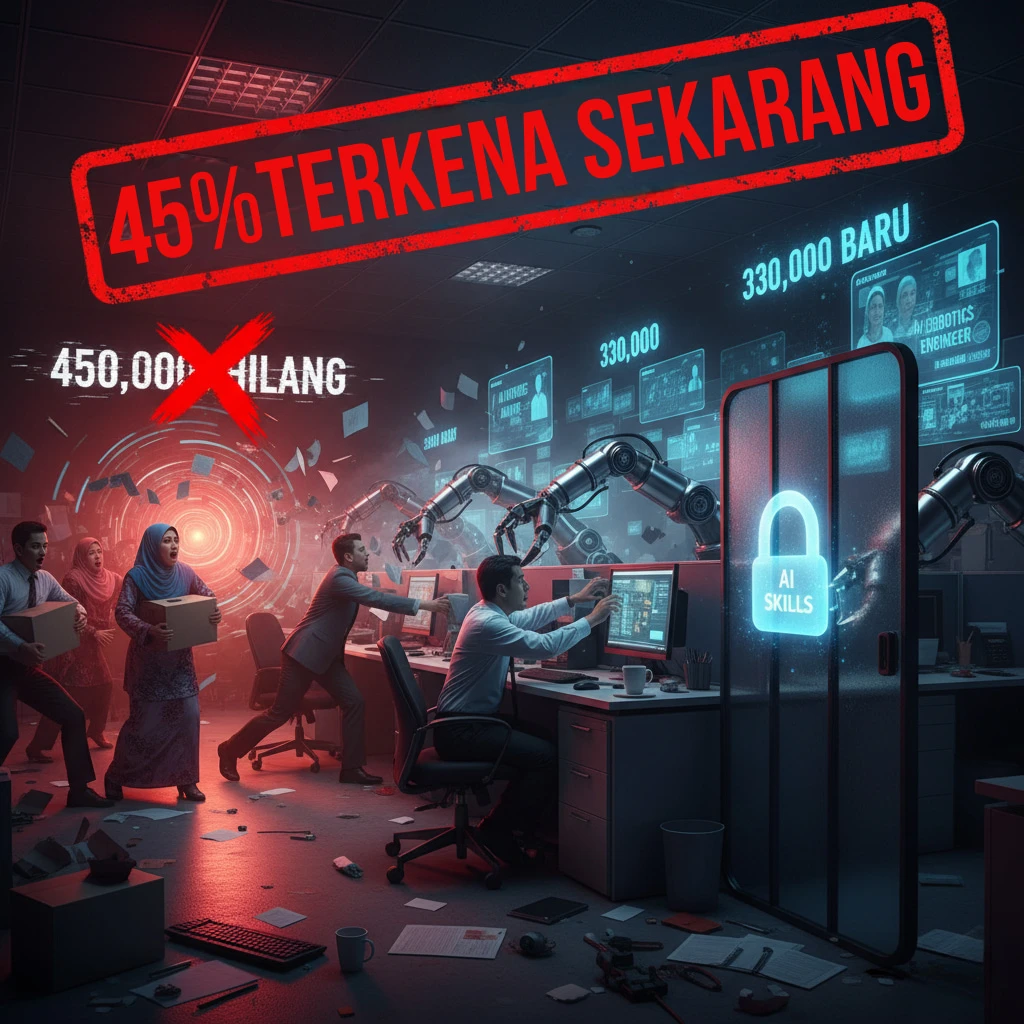
TAPI akan cipta 330,000 kerja baharu.
Inilah ‘creative destruction’ klasik.
Bilik mesyuarat, tahun ini.
Pengurus umumkan alat AI kendalikan laporan berulang.
Separuh pasukan panik (‘kerja saya!’).
Separuh lagi teruja (‘akhirnya boleh fokus strategi!’).
Teka mana separuh dapat naik pangkat?
AI bukan tsunami yang tenggelamkan semua sama rata.
Ia pasang naik - angkat bot yang bersedia.
Tenggelamkan yang berlabuh di pantai lama.
AI tak akan gantikan anda kalau anda tak boleh diganti oleh manusia.
Teknologi urus tugas; anda urus kepercayaan.
Sementara orang lain takut AI, KITA bersedia.
Sementara mereka komplen automasi, KITA tingkatkan kemahiran.
Pemisahan mindset bermula di sini.
Mereka yang tingkatkan kemahiran SEKARANG rebut 330K peluang baharu.
Yang tunggu jadi sebahagian dari 450K yang diganti.
Kebimbangan dijustifikasi.
Jawapan bukan penafian - pembelajaran agresif.
Syarikat yang tahan latihan AI kehilangan bakat.
Kepada pesaing yang tawarkannya.
Coursera/LinkedIn Learning/Google Skills AI.
Kursus fokus Malaysian tersedia.
Realiti #3: Budaya Toksik Bunuh Kerjaya - 59% Pekerja Dah Resign Sebab Ini
59% pekerja Malaysia berhenti untuk lari dari tempat kerja toksik.
Tertinggi di Asia Pasifik.
Cukai budaya toksik kejam.
Kos pengambilan naik, jenama rosak kekal.
Lebih teruk?
48% pencari kerja automatik tolak syarikat dengan reputasi buruk.
Kolam bakat potong separuh sebelum temuduga pun bermula.
Tempat kerja toksik macam kebocoran gas.
Anda tak nampak, tapi perlahan-lahan meracun.
Simptom (burnout, kebimbangan, keraguan diri) muncul kemudian.
Keluar adalah topeng oksigen.
Budaya toksik bunuh kerjaya lebih perlahan dari racun.
Tapi lebih maut.
Keluar adalah oksigen, bukan kelemahan.
Kuasa rasa kepunyaan.
61% akan pergi kalau tak rasa milik.
Bukan tentang faedah.
Tentang penerimaan.
Anda kekal setia kepada syarikat toksik bukan dedikasi.
Itu sabotaj diri yang menyamar sebagai profesionalisme.
Syarikat progresif bina komuniti inklusif.
Sama penting dengan gaji kompetitif.
Kajian persekitaran toksik Randstad.
Belajar tingkah laku bendera merah.
Cerita tempat kerja toksik anda?
Kongsikan detik toksik paling diingati (tanpa nama/syarikat) dalam komen.
Spesifik: adakah pengurusan mikro?
Gaslight?
Curi kredit?
Penghinaan awam?
Cerita paling relatable akan tampil dalam posting LinkedIn kami minggu depan.
Jom kita sahkan trauma masing-masing.
Dan belajar bendera merah bersama.
Realiti #4: Paradoks Kerja Hybrid - 91% Nak Connection, 43% Reject Paksa Balik Office
Paradoks pembukaan.
91% akui kehadiran fizikal di pejabat memudahkan bina hubungan lebih baik.
Namun 43% akan resign kalau dipaksa balik.
(47% Gen Z/Millennials).
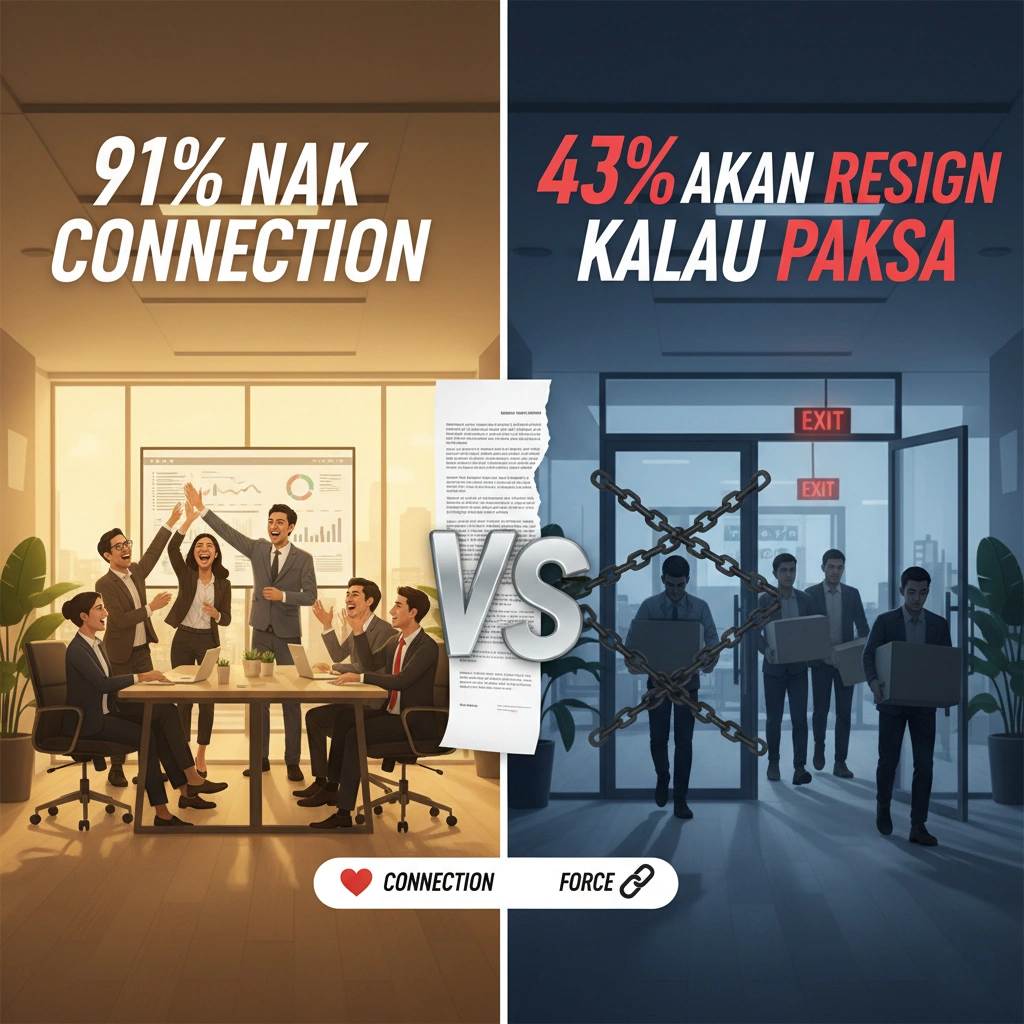
Bukan entitled.
Ini perubahan fundamental.
Mereka dah rasa autonomi, fleksibiliti, tiada commute mencekik jiwa.
Tak nak balik ke model rigid “sebab selama ini buat macam ni”.
Paradoks pejabat-remote macam food delivery.
Nak kualiti restoran (connection) dengan keselesaan rumah (flexibility).
Penyelesaian?
Menu hybrid, bukan all-or-nothing.
Isnin 9 pagi panggilan Zoom.
Boss umumkan ‘full RTO bulan depan, bina budaya syarikat.’
Bahagian komen meletup.
Menjelang Jumaat, 3 top performer resign.
Budaya dibina, cuma bukan yang intended.
Pejabat sepatutnya magnet tarik minda rela.
Bukan penjara paksa badan benci.
Transformasi: Pejabat mesti evolve.
Hub berorientasikan matlamat untuk kolaborasi mendalam.
Sesi brainstorm kreatif, pembinaan budaya.
Bukan pemantauan butts-in-seats.
Boss paksa balik pejabat bukan tentang produktiviti.
Tentang kawalan.
Data buktikan pekerja remote perform lebih baik.
Penyelesaian: Nyatakan dengan jelas KENAPA masa pejabat bernilai.
Workshop, pitching, inovasi - bukan sekadar kehadiran.
Bila tujuan jelas, rintangan menurun.
Realiti #5: Work-Life Balance Dah Kalahkan Gaji - 46.5% Tukar Kerja Untuk Ini
Work-life balance secara rasmi overtake gaji sebagai motivasi kerja #1.
46.5% tukar kerja untuk ini.
Gen X/Millennials (52%/44%).
Balance keutamaan teratas.
Terbakar dari budaya hustle.
Gen Z unik: Hubungan (50%) > balance (47%).
Mereka nak tribe, bukan sekadar waktu fleksibel.
Work-life balance bukan pecahan 50-50.
Macam nisbah nasi-sambal nasi lemak.
Ia disesuaikan.
Gen Z nak extra sos ‘kehidupan’.
Millennials terbakar oleh terlalu banyak cili ‘kerja’.
Sarah berhenti RM8K MNC toksik untuk RM6K startup dengan pasukan solid.
“Saya boleh tidur sekarang,” 6 bulan kemudian.
Gen Z bukan buru bos, mereka buru tribe.
Gaji tarik, rasa kepunyaan kekalkan.
Gen Z dituduh ‘entitled’ sebab nak balance.
Kebenaran?
Generasi sebelum dieksploitasi, dipanggil ‘etika kerja’.
Majikan yang bersaing gaji sahaja akan kalah.
Kepada mereka yang tawarkan nilai holistik.
Boomer hakimi permintaan work-life kita sebagai ‘lemah’.
KITA utamakan kesihatan mental sebagai kekuatan.
Burnout mereka bukan lencana kehormatan.
Ia amaran yang kita ambil iktibar.
Realiti #6: Epidemik Burnout - 67% Pekerja Rasa Letih, Millennials Paling Teruk
67% pekerja Malaysia burnout.
Lonjakan dari 58% beberapa tahun lepas.
Epidemik tidak kelihatan sama dahsyat dengan wabak fizikal.
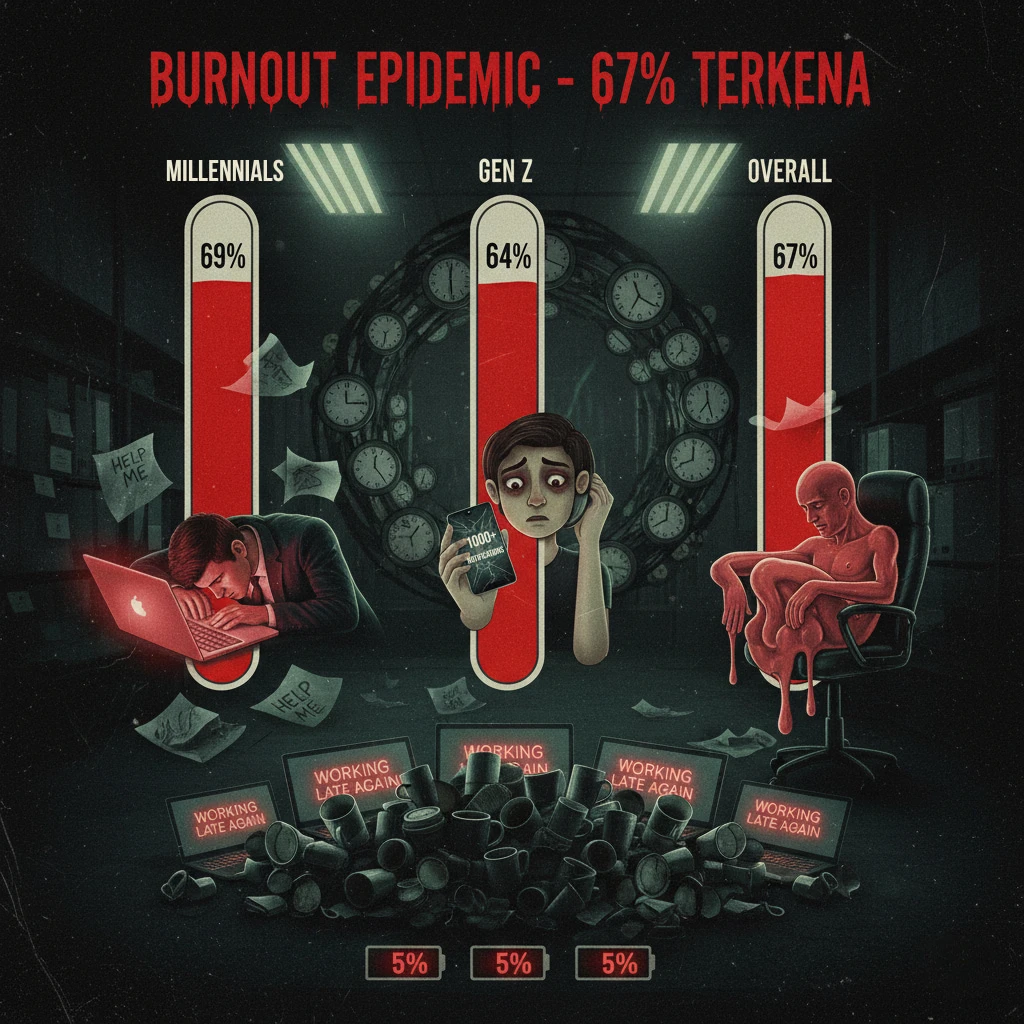
Pecahan generasi: Millennials paling teruk 69%, Gen Z 64%.
“Generasi jambatan” dipicit.
Tekanan pengurusan tradisional dari atas.
Permintaan Gen Z dari bawah.
Tambah tekanan kewangan (52%) + genangan (49%).
Punca utama.
55% nilai work-life balance mereka “lemah/sederhana”.
Burnout macam bateri telefon rosak.
Fast charging (kerja lebih) rosakkan kapasiti jangka panjang.
Perlukan slow charging konsisten (sempadan) untuk jangka hayat.
Burnout bukan pingat perang buktikan dedikasi.
Ia bendera putih merayu sempadan.
Silver lining.
58% pekerja remote penuh laporkan balance “melebihi purata”.
Berbanding hanya 42% pekerja pejabat.
Laluan jelas - fleksibiliti adalah intervensi terapeutik.
Budaya burnout bukan kebetulan.
Ia direka untuk ekstrak nilai maksimum sebelum anda patah.
Kemudian ganti.
69% Millennials burnout cuba puaskan semua.
Bos, ibu bapa, masyarakat.
Masa untuk puaskan diri sendiri.
Radikal? Kepada mereka.
Perlu? Kepada kita.
Syarikat rigid tentang mandat pejabat walaupun ada bukti.
Actively menyumbang kepada kemerosotan kesihatan mental.
Sokongan kesihatan mental: Befrienders Malaysia (03-76272929), MIASA.
Jangan tunggu sampai titik pecah.
Realiti #7: Gen Z Cari Purpose - 65% Akan Keluar Kalau Tak Rasa Belong
65% Gen Z akan berhenti kalau tak rasa belong.
Rasa kepunyaan adalah mata wang baharu.
Stats teras rapid-fire.
27% berhenti atas percanggahan nilai.
56% rasa seperti “minoriti” di tempat kerja.
37% sanggup terima potong gaji untuk kawan baik.
Rasa kepunyaan untuk Gen Z macam signal WiFi.
Tiada connection, mereka disconnect terus.
Tiada kesabaran untuk tempoh ‘loading’ seperti generasi lebih tua.
Rasa kepunyaan kalahkan bonus bila hati terlibat.
37% terima potong gaji untuk persahabatan tulen.
Data buktikannya.
Syarikat khabar DEI tapi praktik tokenism.
Gen Z detect bullshit instantly.
Sebab tu 56% rasa macam minoriti.
Gen Z dapat label ‘entitled’ sebab tuntut belonging.
Kebenaran?
Kita sekadar menolak untuk settle dengan kurang dari maruah manusia.
Di tempat kerja.
Itu evolusi, bukan entitlement.
Mereka utamakan hubungan (50%) berbanding balance (47%).
Metrik kerja tradisional tak mencukupi.
Perlukan “gaji psikologi”.
Majikan transaksional kehilangan Gen Z kepada pembina komuniti.
Kalau anda baca sampai sini, anda bukan pekerja biasa.
Yang puas dengan status quo.
Anda operator strategik.
Realiti #8: Gap Gaji Masih Real - 56% Gen Z Demotivated Sebab Compensation
Semakan realiti ekonomi.
56% Gen Z, 52% Millennials kurang motivasi oleh gaji.
Walaupun cakap “purpose over money”.
39% berhenti atas genangan.
49% Millennials kecewa dengan tiada laluan pertumbuhan.
Job-hopping melonjak 23% → 35.2% dalam beberapa tahun.
Genangan gaji macam kontrak telefon.
Terkunci kadar rendah sementara harga pasaran naik.
Orang bijak shopping around, negotiate deal baharu.
Air genangan biak nyamuk.
Kerjaya genangan biak penyesalan.
Mengalir atau reput.
Mereka bina kerjaya dalam era di mana kesetiaan = keselamatan.
KITA navigate era di mana kesetiaan = risiko.
Permainan berbeza, peraturan berbeza.
Berhenti hakimi kita dengan playbook mereka.
Kematian kesetiaan.
Syarikat yang tak address gaji adil + perkembangan hadapi churn berterusan.
Latih orang untuk majikan seterusnya.
‘Kesetiaan kepada syarikat’ adalah penipuan.
Bila syarikat layoff pekerja setia pertama sewaktu downturn.
Kesetiaan kepada DIRI SENDIRI.
Panduan gaji JobStreet/AJobThing.
Kenali kadar pasaran anda.
Cakap benar: Gaji vs Budaya trade-off
Masa undi - anda pilih yang mana?
A) RM10K persekitaran toksik, tiada pertumbuhan
B) RM7K pasukan menyokong, perkembangan jelas
C) RM8.5K budaya ok, pertumbuhan sederhana
D) Saya tinggalkan Malaysia (kehidupan expat)
Tulis jawapan anda + 1 baris kenapa.
Zon tanpa penghakiman - situasi setiap orang berbeza.
Jom kita tengok kalau data sepadan dengan perasaan kita.
Realiti #9: Budaya Malaysia - Kuasai Harmony, Hierarchy, Dan Face
Tempat kerja Malaysia berjalan atas 3 tiang tidak bertulis.
Abaikan ini, kerjaya tersangkut.
Harmony: Budaya berorientasikan kumpulan.
Yang sangat tekankan hubungan harmoni.
Konflik terus terang tidak digalakkan - ganggu kepaduan.
Belajar disagree dengan hormat, bagi feedback membina.
Navigate pertikaian secara halus.
Pertengkaran awam = kerosakan reputasi.
Hierarchy: Hormat kepada umur/jawatan adalah asas.
Tempat duduk mesyuarat (senior prominent).
Protokol perkenalan (tertib hierarki).
Pola komunikasi (junior tunggu senior cakap dulu).
Bukan servile - kecerdasan budaya.
Face: Reputasi, maruah, kedudukan sosial.
JANGAN SEKALI-KALI buat orang hilang muka.
Kritik awam, tolakan terus, dipermalukan.
Komunikasi tidak langsung adalah default.
“Saya akan cuba” (tidak boleh).
“Biar saya semak dulu” (tidak mungkin).
“Mencabar” (tidak).
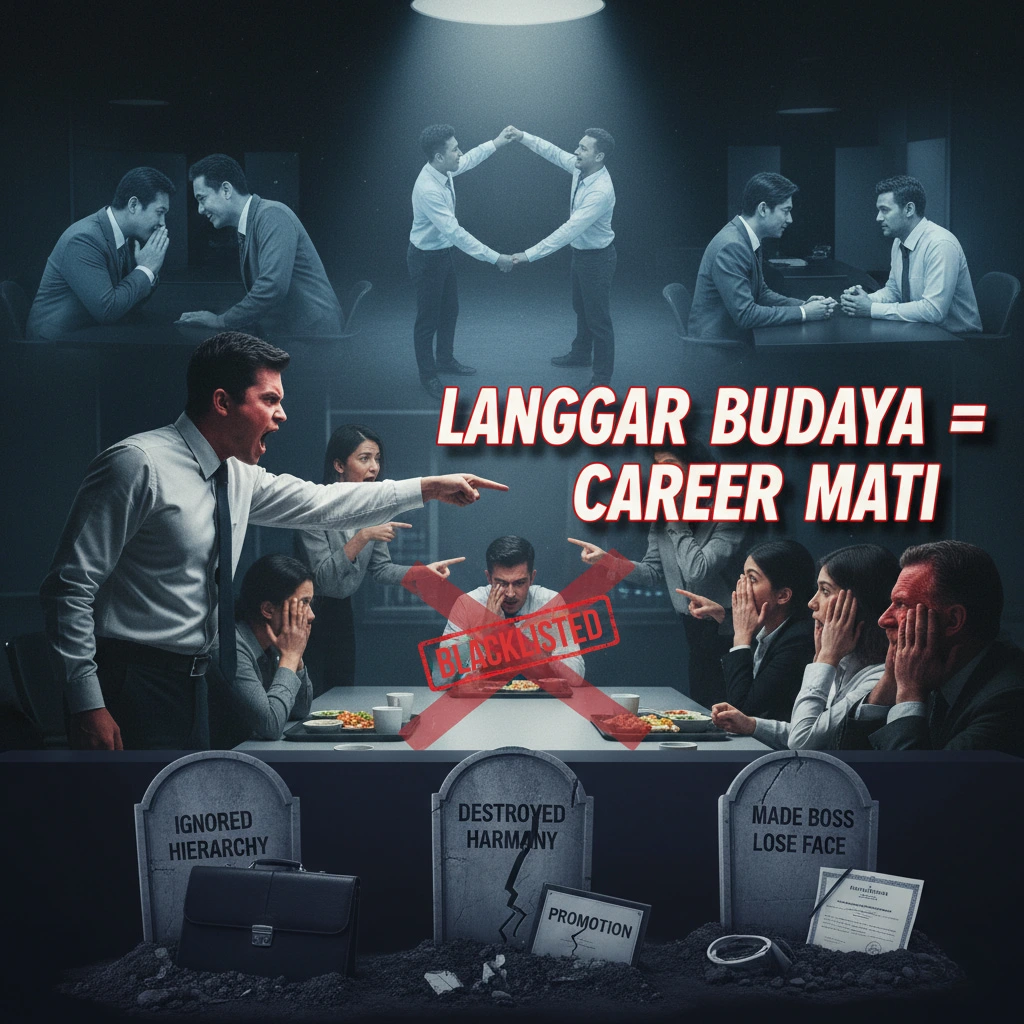
Budaya ‘muka’ tempat kerja Malaysia macam peraturan memandu.
Buku panduan rasmi kata satu, realiti jalan kata lain.
Kuasai peraturan tidak rasmi untuk survive.
Pekerja baharu betulkan kesilapan rakan senior.
Secara terbuka dalam mesyuarat.
Bilik sunyi.
Rakan senyum, kata ‘poin bagus, jom bincang lepas ni.’
Pekerja baharu fikir menang.
Sebenarnya baru hilang mata ‘muka’ dari seluruh pasukan.
Trajektori kerjaya berubah.
Kuasai dinamik ‘muka’, kuasai tempat kerja Malaysia.
Abaikannya, kerjaya mati perlahan secara awam.
Budaya ‘muka’ Malaysia membolehkan bos toksik elak akauntabiliti.
Cakap benar dilabel ‘kurang ajar’.
Decode isyarat halus, berkomunikasi dengan sesuai.
Keberkesanan tempat kerja.
Pijak sembarangan = hubungan rosak tidak boleh pulih.
Panduan Pengurusan Malaysia Commisceo Global.
Panduan etika Kementerian Perdagangan.
Penting untuk pendatang baharu.
Anda kenali data berbanding pendapat.
Fakta berbanding ‘selalu buat macam ni’.
Sebab itu anda di sini.
Realiti #10: KL vs Penang vs JB - Pilih Bandar Ikut DNA Kerjaya
3 bandar Malaysia evolved jadi ekosistem profesional khusus.
Geografi adalah takdir kerjaya.
KL: Ibu kota kewangan.
Siling gaji tertinggi.
Pressure cooker - budaya hustle, neraka traffic, mimpi buruk work-life.
Untuk corporate warrior sanggup korban.
Penang: “Silicon Valley of East”.
Hub tech/pembuatan.
Balance lebih baik, gaji lebih rendah untuk bukan engineer.
Pengurus pemasaran RM5K vs RM8K KL.
Model ekonomi berbeza.
JB: Pembuatan/logistik.
Proximity Singapura cipta dinamik unik.
Ideal untuk pakar rantaian bekalan.
Pilih KL/Penang/JB macam pilih mamak/kafe/fine-dining.
Bergantung selera (matlamat kerjaya), bajet (trade-off).
Gaya hidup (keutamaan pace).
Tiada pilihan ‘terbaik’, hanya pilihan ‘betul-untuk-anda’.
James trade KL RM12K stress untuk Penang RM9K ketenangan.
“Kerugian kewangan terbaik pernah,” posting LinkedIn.
Geografi adalah takdir kerjaya.
Pilih bandar sepadan DNA, bukan kejar ‘lebih baik’.
Penjajaran > tarikan.
Insight utama: Graduan kewangan → KL.
Jurutera → Penang.
Pakar supply chain → JB.
Jurutera Penang dapat kurang dari pemasar KL bukan tidak adil.
Model nilai berbeza.
Berhenti compare epal dengan oren.
Perbandingan kos sara hidup Numbeo.
Data agensi pelaburan negeri sebelum decide.
Memahami 10 realiti ini memisahkan profesional berpengetahuan.
Dari majoriti keliru.
Apa Yang Perlu Dibuat Sekarang: Pelan Tindakan Untuk Bergerak
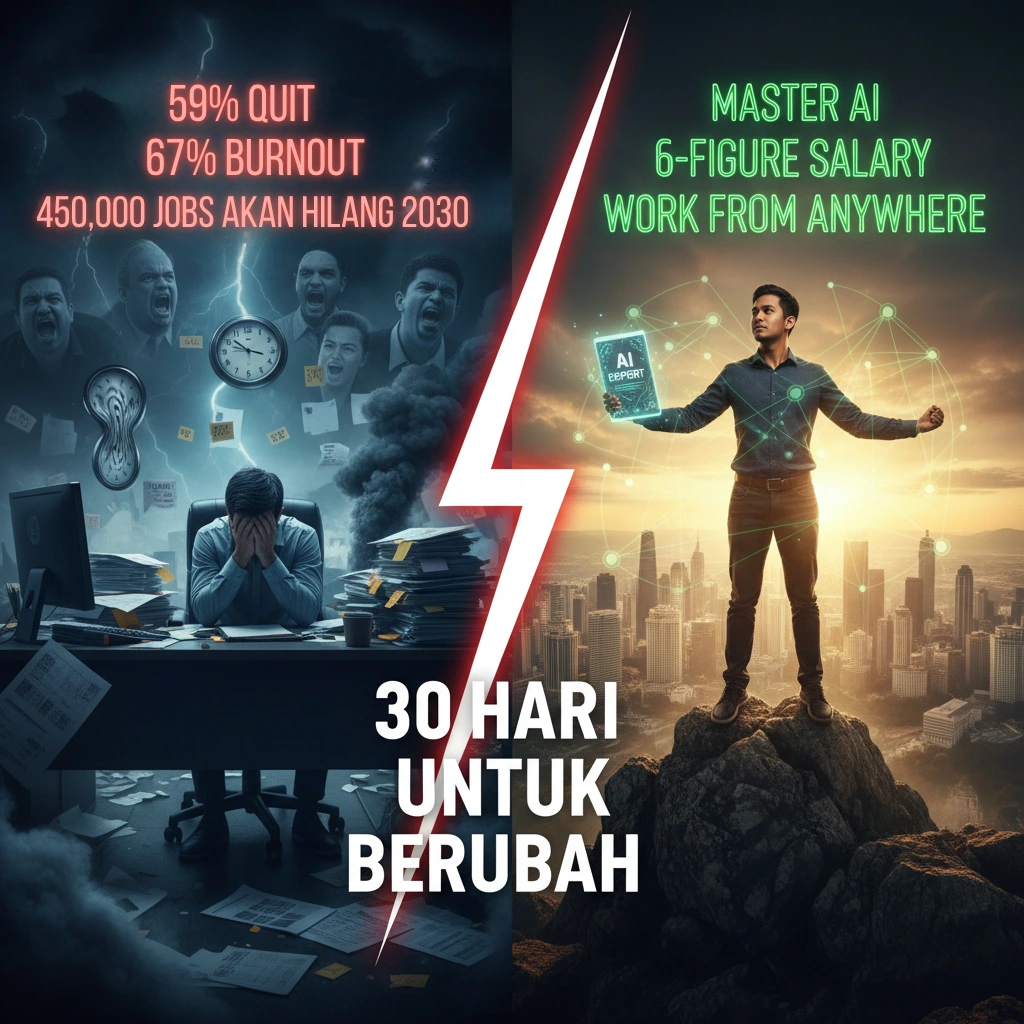
Data jelas.
Trend tidak dapat dinafikan.
Tempat kerja Malaysia sekarang fundamentally berbeza dari setahun lepas.
Langkah konkrit yang perlu diambil sekarang, bukan nanti.
Dalam 30 Hari Pertama
Pendaftaran kursus kemahiran AI.
Block kalendar 3 jam/minggu.
Audit LinkedIn: foto, ringkasan, 1 post industri.
Kajian benchmark gaji (Randstad/JobStreet/AJobThing).
Sertai 1 persatuan profesional (IEEE/SME/MDA).
Hadiri acara.
Tetapkan sempadan work-life.
Komunikasi dengan jelas.
Block kalendar hujung minggu.
Masa peribadi tidak boleh rundingkan.
Dalam 90 Hari
Siapkan kursus AI.
Aplikasi dalam projek kerja.
Dokumentasi hasil.
Perbualan kerjaya dengan pengurus.
Pencapaian + permintaan pertumbuhan + latihan.
2 acara networking.
Pendekatan nilai-dahulu.
Follow-up LinkedIn.
Penilaian budaya: bendera merah?
Mula explore senyap-senyap.
Kajian bandar sasaran kalau consider pindah.
Kos + industri + gaya hidup + lawat.
Dalam 6-12 Bulan
Kuasai 2 alat AI/automasi.
Volunteer untuk projek berkaitan.
Bina 3-5 hubungan kukuh.
Check-in berkala.
Bantuan tulen.
Capai impak boleh ukur.
Dokumen semua (% kecekapan, penjimatan kos, hasil pasukan).
Nilai pelaburan majikan vs ekstraksi.
Komunikasi keperluan.
Job hunt kalau tak responsif.
Bina dana kecemasan 3-6 bulan.
Kebebasan untuk gerak pertumbuhan.
Bangunkan reputasi kecerdasan budaya.
Perselisihan hormat.
Penguasaan dinamik muka.
Tindakan mana yang anda komit minggu ini?
Dari pelan 30-hari di atas, pilih SATU langkah boleh laksana.
Daftar kursus AI?
Audit LinkedIn?
Kajian gaji?
Tetapkan sempadan?
Sertai kumpulan profesional?
Komen pilihan anda.
Komitmen awam = 65% kadar penyiapan lebih tinggi (kajian psikologi).
Tag seseorang jadi rakan akauntabiliti anda.
Jom bergerak bersama.
Kesimpulan: Window Sedang Terbuka - Masa Untuk Bergerak Adalah Sekarang
Tindakan kalahkan pemahaman.
Baca tanpa pelaksanaan = sifar impak.
Realiti pasaran: 59% sedang hire.
44% tuntut kemahiran AI.
35.2% planning bergerak.
Peluang UNTUK YANG BERSEDIA.
Anda kini ada insights yang kebanyakan rakan sekerja tak ada.
Guna dengan bijak.
Kongsi secara selektif.
Pengetahuan ini adalah kuasa.
Tapi hanya kalau anda execute.
Pembaca ramai.
Pelaksana sedikit.
Jadilah yang sedikit.
Masa untuk bergerak bukan bulan depan, bukan lepas cuti.
SEKARANG.
Realiti mana yang paling hit anda?
Tag seseorang yang perlukan ini.
Jadilah penyelamat kerjaya mereka hari ini.
Soalan bukan “patut saya bergerak”.
Soalan: siapa yang akan step through dengan yakin?
35.2% dari kita planning bergerak.
Sementara yang lain stuck komplen.
Soalan: kumpulan mana anda nak jadi?
Penggerak atau pengadu?
Kita penggerak.
Join kita.
Pilihan anda.
Konsekuensi anda.
Yang Tak Diajar University dah ajar.
Sekarang masa execute.